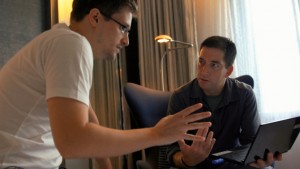 Edward Snowden made a surprise appearance at the “News Organizations & Digital Security” convening. His message: Use encryption and be as safe as you can be, but don’t settle for playing defense. Demand policy that doesn’t turn journalism into a guerrilla activity, and that increases government accountability.
Edward Snowden made a surprise appearance at the “News Organizations & Digital Security” convening. His message: Use encryption and be as safe as you can be, but don’t settle for playing defense. Demand policy that doesn’t turn journalism into a guerrilla activity, and that increases government accountability.
His news in his revelations, he said, weren’t so much about surveillance as about “how the balance of power in society is shifting from institutions such as the press, and civil society more broadly, and toward governments that afford themselves in secret more powers and authority without the consent or awareness of the public.”
Yes, journalists can use PGP and Tor and SecureDrop, but “by accepting the status quo, we are backfooting the First Amendment. “ With security measures, “we can protect when necessary,” but with good journalism that pushes for policy change “we can also ensure that it isn’t necessary.” And then, he said, we’d be in a position to help people in countries where there is no government accountability.
While journalists master the often kludgy and frustrating software that makes their communication and data storage more secure, “we should never accept this as ordinary business.”
“Journalists and institutions need to ask themselves if they want to be condemned to fight with intelligence organizations with a $75 billion budget just to report the news.”
Encryption every day, everywhere.
Still, he’s not slighting the importance of good encryption. Snowden lives in an encrypted world, and it’s not pretty. “I haven’t used a naked Internet connection since long before the release. I use Tor and other technologies every day.”
He uses free tools, because he can’t buy anything on the Internet anymore, as one of the costs of exile under surveillance. And so he knows better than anyone “how crude these tools are. They were all developed before the revelations, and the threat models we use today. “
Snowden is not under any illusion that crowdsourcing an open-source solution is the answer. “Tor was designed without adversaries such as the NSA in mind. We need to move beyond this. But I won’t happen from a teenager in a basement. It will come from grad students with scholarships, and from corporations with a for-pay business models.”
Insecure in Congress.
Snowden pointed out that Congressional websites and communication are all open to NSA surveillance, at the same time that intelligence agencies are demanding of Internet businesses the kind of back-door access that is catnip to hackers.
“We can’t go on with defenseless, business-as-usual communication in Congress,” he said. “If members of Congress can’t even communicate with each other securely, how will we discuss important issues? If we are an open book to all our adversaries, while the government has a tight, information-controlled mindset toward the public, then the only people who will know what’s going on in government are its enemies.”
